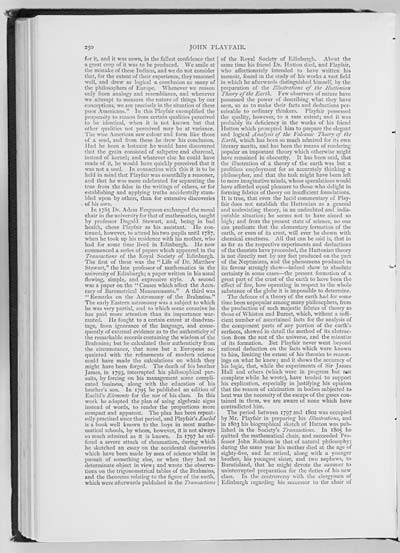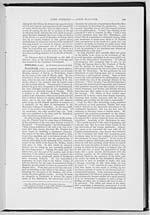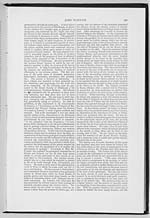250
for it, and it was sown, in the fullest confidence that
a great crop of it was to be produced. We smile at
the mistake of these Indians, and we do not consider
that, for the extent of their experience, they reasoned
well, and drew as logical a conclusion as many of
the philosophers of Europe. Whenever we reason
only from analogy and resemblance, and whenever
we attempt to measure the nature of things by our
conceptions, we are precisely in the situation of these
poor Americans." In this Playfair exemplified the
propensity to reason from certain qualities perceived
to be identical, when it is not known but that
other qualities not perceived may be at variance.
The wise American saw colour and form like those
of a seed, and from these he drew his conclusion.
Had he been a botanist he would have discovered
that the grain consisted of saltpetre and charcoal,
instead of kernel; and whatever else he could have
made of it, he would have quickly perceived that it
was not a seed. In connection with this it is to be
held in mind that Playfair was essentially a reasoner,
and that he was more celebrated for separating the
true from the false in the writings of others, or for
establishing and applying truths accidentally stum-
bled upon by others, than for extensive discoveries
of his own.
In 1785 Dr. Adam Ferguson exchanged the moral
chair in the university for that of mathematics, taught
by professor Dugald Stewart, and, being in bad
health, chose Playfair as his assistant. He con-
tinued, however, to attend his two pupils until 1787,
when he took up his residence with his mother, who
had for some time lived in Edinburgh. He now
commenced a series of papers which appeared in the
Transactions of the Royal Society of Edinburgh.
The first of these was the "Life of Dr. Matthew
Stewart," the late professor of mathematics in the
university of Edinburgh; a paper written in his usual
flowing, simple, and expressive style. A second
was a paper on the " Causes which affect the Accu-
racy of Barometrical Measurements." A third was
"Remarks on the Astronomy of the Brahmins."
The early Eastern astronomy was a subject to which
he was very partial, and to which some conceive he
has paid more attention than its importance war-
ranted. He fought to a certain extent at disadvan-
tage, from ignorance of the language, and conse-
quently of external evidence as to the authenticity of
the remarkable records containing the wisdom of the
Brahmins; but he calculated their authenticity from
the circumstance, that none but a European ac-
quainted with the refinements of modern science
could have made the calculations on which they
might have been forged. The death of his brother
James, in 1793, interrupted his philosophical pur-
suits, by forcing on his management some compli-
cated business, along with the education of his
brother's son. In 1795 he published an edition of
Euclid's Elements for the use of his class. In this
work he adopted the plan of using algebraic signs
instead of words, to render the proportions more
compact and apparent. The plan has been repeat-
edly practised since that period, and Playfair's Euclid
is a book well known to the boys in most mathe-
matical schools, by whom, however, it is not always
so much admired as it is known. In 1797 he suf-
fered a severe attack of rheumatism, during which
he sketched an essay on the accidental discoveries
which have been made by men of science whilst in
pursuit of something else, or when they had no
determinate object in view; and wrote the observa-
tions on the trigonometrical tables of the Brahmins,
and the theorems relating to the figure of the earth,
which were afterwards published in the Transactions
of the Royal Society of Edinburgh. About the
same time his friend Dr. Hutton died, and Playfair,
who affectionately intended to have written his
memoir, found in the study of his works a vast field
in which he afterwards distinguished himself, by the
preparation of the Illustrations of the Huttonian
Theory of the Earth. Few observers of nature have
possessed the power of describing what they have
seen, so as to make their facts and deductions per-
ceivable to ordinary thinkers. Playfair possessed
the quality, however, to a rare extent; and it was
probably its deficiency in the works of his friend
Hutton which prompted him to prepare the elegant
and logical Analysis of the Volcanic Theory of the
Earth, which has been so much admired for its own
literary merits, and has been the means of rendering
popular an important theory which otherwise might
have remained in obscurity. It has been said, that
the illustration of a theory of the earth was but a
profitless employment for so accurately thinking a
philosopher, and that the task might have been left
to more imaginative minds, whose speculations would
have afforded equal pleasure to those who delight in
forming fabrics of theory on insufficient foundations.
It is true, that even the lucid commentary of Play-
fair does not establish the Huttonian as a general
and undeviating theory, in an undoubted and indis-
putable situation; he seems not to have aimed so
high; and from the present state of science, no one
can predicate that the elementary formation of the
earth, or even of its crust, will ever be shown with
chemical exactness. All that can be said is, that in
as far as the respective experiments and deductions
of the theorists have proceeded, the Huttonian theory
is not directly met by any fact produced on the part
of the Neptunians, and the phenomena produced in
its favour strongly show�indeed show to absolute
certainty in some cases�the present formation of a
great part of the crust of the earth to have been the
effect of fire, how operating in respect to the whole
substance of the globe it is impossible to determine.
The defence of a theory of the earth had for some
time been unpopular among many philosophers, from
the production of such majestic fabrics of theory as
those of Whiston and Burnet, which, without a suffi-
cient number of ascertained facts for the analysis of
the component parts of any portion of the earth's
surfaces, showed in detail the method of its abstrac-
tion from the rest of the universe, and the minutiae
of its formation. But Playfair never went beyond
rational deduction on the facts which were known
to him, limiting the extent of his theories to reason-
ings on what he knew; and it shows the accuracy of
his logic, that, while the experiments of Sir James
Hall and others (which were in progress but not
complete while he wrote), have tended to support
his explication, especially in justifying his opinion
that the reason of calcination in bodies subjected to
heat was the necessity of the escape of the gases con-
tained in them, we are aware of none which have
contradicted him.
The period between 1797 and 1802 was occupied
by Mr. Playfair in preparing his Illustrations, and
in 1803 his biographical sketch of Hutton was pub-
lished in the Society's Transactions. In 1805 he
quitted the mathematical chair, and succeeded Pro-
fessor John Robison in that of natural philosophy;
during the same year his mother died at the age of
eighty-five, and he retired, along with a younger
brother, his youngest sister, and two nephews, to
Burntisland, that he might devote the summer to
uninterrupted preparation for the duties of his new
class. In the controversy with the clergymen of
Edinburgh regarding his successor to the chair of

![]() Universal Viewer |
Universal Viewer | ![]() Mirador |
Large image | Transcription
Mirador |
Large image | Transcription
![]()

